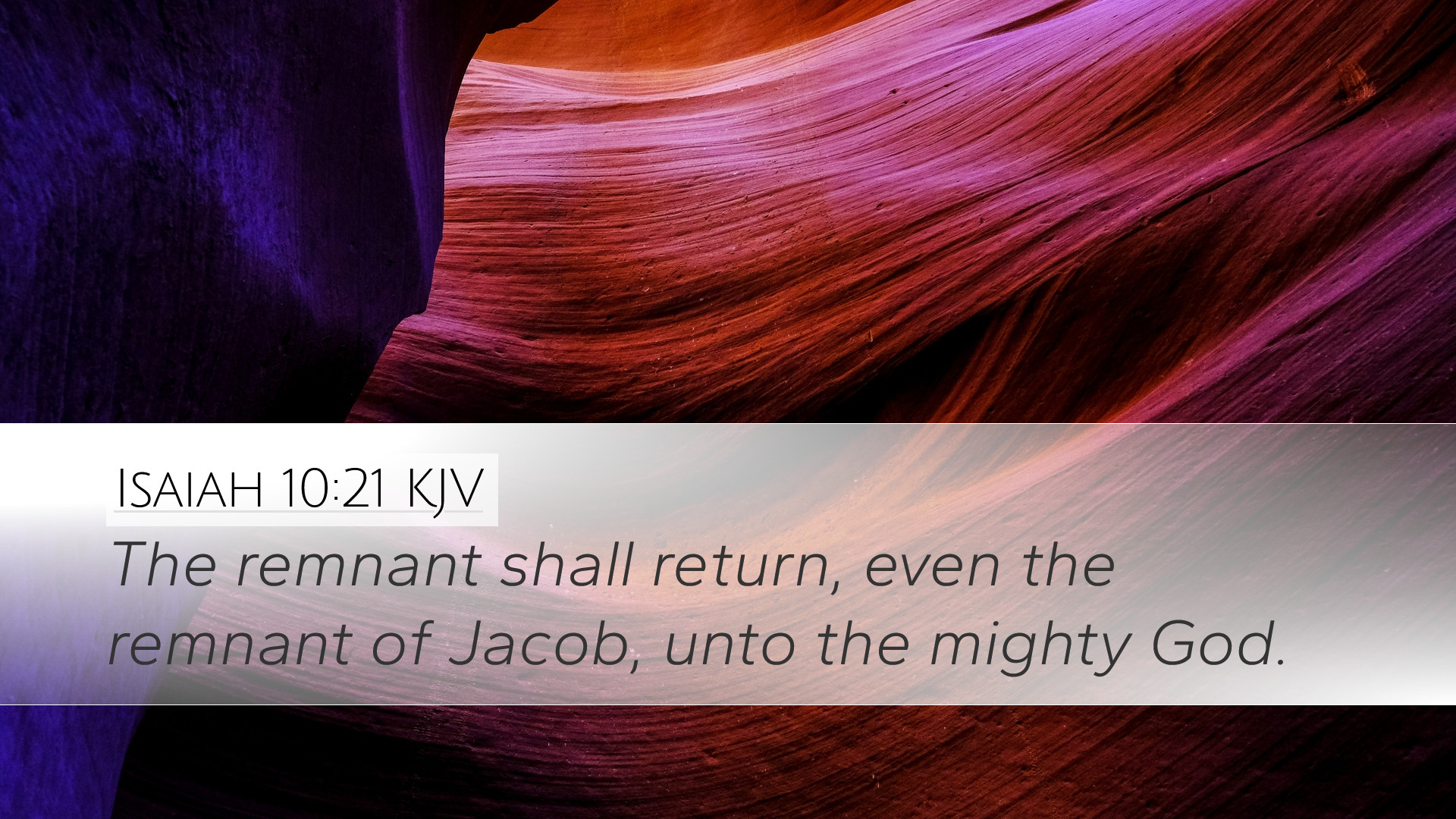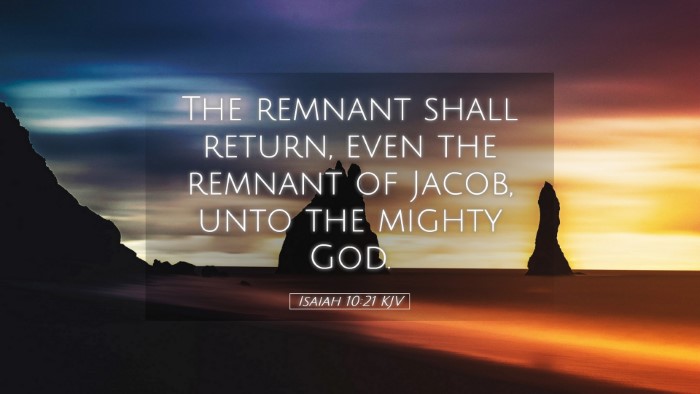Commentary on Isaiah 10:21
Verse: Isaiah 10:21
"The remnant will return, the remnant of Jacob, to the Mighty God."
Introduction
This verse is a profound declaration of hope and restoration for the people of Israel. In the context of Isaiah, it comes during a dire period when Israel and Judah were facing the consequences of their disobedience and the looming threat of Assyrian invasion. The prophetic voice of Isaiah emphasizes the faithfulness of God in preserving a remnant of His people, which is critical for understanding the redemptive plan outlined in Scripture.
Contextual Analysis
Understanding the historical and theological context of Isaiah is essential for grasping the depth of this prophetic statement. Isaiah prophesies from around 740 to 681 BC, a time marked by moral decay and political instability. The Assyrian Empire, known for its brutal conquests, serves as a backdrop for this message of hope. The people of Judah often neglected their covenant with God, leading to idolatry and injustice.
Commentary Insights
- Matthew Henry: Highlights the concept of a remnant, emphasizing that "the remnant shall return." This signifies God’s grace in preserving a portion of His people despite widespread apostasy. Henry posits that this remnant will bear witness to God’s character and covenant faithfulness.
- Albert Barnes: Suggests that the phrase "remnant of Jacob" is significant for signifying both the physical survival of the nation and the spiritual renewal among those who turn back to God. He reflects on the broader implication that even in judgment, God maintains a people for Himself who will return to their roots in faith and obedience.
- Adam Clarke: Emphasizes the term "Mighty God" as a revelation of God's strength and sovereignty. Clarke connects this title to the ultimate deliverance and protection that the remnant will experience, portraying God as a warrior who defends His people against their oppressors. His commentary brings forth the theological insight that reliance on God is essential in times of tribulation.
Theological Implications
Theologically, Isaiah 10:21 encapsulates several pivotal themes relevant for pastors, theologians, and students of Scripture:
- God’s Sovereignty: The narrative underscores God's control over history. Despite the Assyrian threat, it is God who ultimately decides the fate of nations and peoples.
- The Concept of the Remnant: The idea of a remnant becomes a recurrent theme in biblical theology, representing those who remain faithful to God amidst widespread unfaithfulness. This group is vital for the continuation of God's purposes.
- Restoration and Hope: The call for a return to God post-judgment reflects God's desire for reconciliation. It conveys that no matter how far His people stray, there is always a path back to Him.
- Messianic Anticipation: Scholars often link the remnant's return to the coming of Christ, who is the ultimate fulfillment of the promise of restoration. Isaiah’s vision extends beyond immediate contexts, pointing to the greater reality of salvation offered through Jesus.
Practical Applications
For pastors and church leaders, Isaiah 10:21 serves as a poignant reminder of the importance of shepherding the remnant in today’s context. Here are some practical insights:
- Encouraging Faithfulness: Like the remnant, congregants should be encouraged to remain faithful in turbulent times, reaffirming their covenant commitment to God.
- Preparation for Restoration: Church leaders should seek to prepare their communities for restoration by teaching the ways of God and fostering environments ripe for repentance and renewed faith.
- Celebration of God’s Faithfulness: Moments of reflection on God’s past faithfulness should be integrated into church life to inspire hope and trust in His ongoing provision.
- Dialogue on Judgment and Mercy: Engaging congregations in discussions about the balance between divine judgment and mercy can cultivate a deeper understanding of God's character.
Conclusion
Isaiah 10:21 stands as a beacon of hope for all who find themselves in spiritual desolation. The significance of "the remnant" serves as a reminder that God is continually at work, preserving a faithful people even amidst judgment and chaos. Through a comprehensive understanding of this verse, drawn from the insights of respected biblical scholars, we are equipped to grasp the weight of God’s promise of restoration. This message continues to resonate in today's world, calling believers to return to the "Mighty God" and trust in His unfailing love and power.


